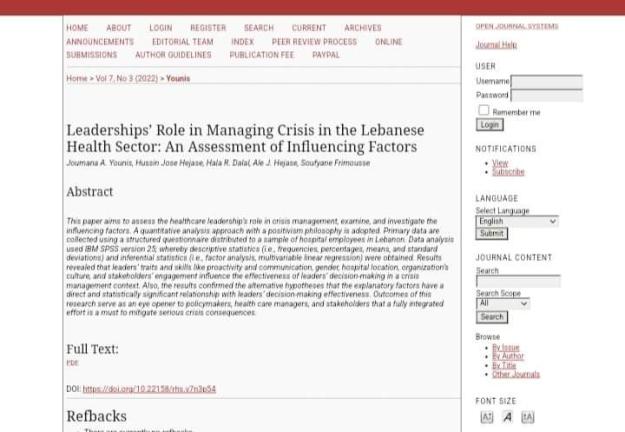
في سياق توالي الدراسات بمجال الرعاية الصحية، وبعد دراستهم السابقة؛ دراسة جديدة نشرت عبر: Research in Health Science بعنوان:
Leaderships’ Role in Managing Crisis in the Lebanese Health
Sector: An Assessment of Influencing Factors
لعميدة كليّة إدارة الأعمال في جامعة الجنان الدكتورة جومانة يونس، والباحثة في جامعة CNAM Paris وMontpellier France؛
والباحثين: أ.د حسين حجازي، الباحثة حلا دلال، أ.د علي حجازي(LAU) ، وأ.د سفيان فريموس (ESSEC Paris).
*موجز
تهدف الدراسة إلى تقييم دور قيادة الرعاية الصحية في إدارة الأزمات، والتحقق من العوامل المؤثرة فيها. تمّ إعتماد المنهج الكمي حيث جمعت البيانات الأولية من إخلال توزيع إستبيان على عينة من موظفي المستشفيات في لبنان، وقد إستخدم لتحليل البيانات IBM SPSS الإصدار 25 حيث تم التطرق إلى الإحصاء الوصفي (تكرارات، نسب مئوية، إنحرافات معيارية، ...) والإحصاء الإستدلالي (تحليل العوامل، الإنحدار الخطي متعدد المتغيرات، ...).
كشفت النتائج أن سمات ومهارات القادة، كالمبادرة والتواصل، الجنس، الموقع الجغرافي للمستشفى، ثقافة المنظمة، ومشاركة أصحاب المصلحة تؤثر على فعالية عملية صنع القرار لدى القادة أثناء إدارة الأزمات.
كما أكدت النتائج على الفرضيات البديلة والتي تنص على أن العوامل التفسيرية لها علاقة مباشرة ذات دلالة إحصائية بفعالية القادة في إتخاذ القرار. إن نتائج الدراسة تبين ضرورة إستبصار صانعي السياسات ومديري الرعاية الصحية وأصحاب المصلحة إلى أن بذل جهد متكامل تماما هو أمر لا بد منه للحد من عواقب الأزمات الخطيرة.
Abstract
This paper aims to assess the healthcare leadership’s role in crisis management, examine, and investigate the influencing factors. A quantitative analysis approach with a positivism philosophy is adopted. Primary data are collected using a structured questionnaire distributed to a sample of hospital employees in Lebanon. Data analysis used IBM SPSS version 25; whereby descriptive statistics (i.e., frequencies, percentages, means, and standard deviations) and inferential statistics (i.e., factor analysis, multivariable linear regression) were obtained. Results revealed that leaders’ traits and skills like proactivity and communication, gender, hospital location, organization’s culture, and stakeholders’ engagement influence the effectiveness of leaders’ decision-making in a crisis management context. Also, the results confirmed the alternative hypotheses that the explanatory factors have a direct and statistically significant relationship with leaders’ decision-making effectiveness. Outcomes of this research serve as an eye opener to policymakers, health care managers, and stakeholders that a fully integrated effort is a must to mitigate serious crisis consequences.
للإطلاع على البحث: http://dx.doi.org/10.22158/

Follow us on